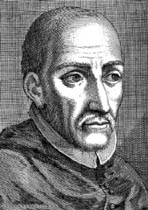Toribio Rodríguez de Mendoza

Toribio Rodríguez de Mendoza (1750–1825) was a
Early life
He was born on 15 April 1750 in
When the Republic was born, he was next to his disciples, sharing the responsibilities of the
During that time, Chachapoyas was a district of the Bishopric of Trujillo. In this city, the region's main political and intellectual institutions were found. Still a child, he was sent to this city to attend seminary.
He studied
Academic career

His interest in education ran in his family. His parents, Santiago Rodríguez and Josefa Collantes, were wealthy owners of a noble house in the main square of Chachapoyas. They had taken an active part in the efforts to provide the city with a school.
While a student, he began working in the teaching field, showing considerable talent. His prestige as a professor had already grown when the
In this center he took the
His talent opened the doors of San Marcos for him, where they delivered him a chair in 1773. During this time he ordained himself in four minor degrees and in 1778 he became a presbyter.
Presbyter
He devoted himself to the affairs of his ministry. Through a contest he won the parish of Marcabal, an indigenous town placed in Huamachuco.
The young priest was already incorporated into the intellectual elite of the epoch. He was called to
Until then, Rodríguez had been an eager and passionate reader of the
Tribune

He fought to impose education in a common language, the study of
Despite his
In 1814, his disciples and friends founded the Sociedad Filantrópica (Philanthropic Society) to spread the ideals of the American Revolution with clear anti-monarchist tendency.
The professor was already aged. Opponents of his reforms accused him of propagating prohibited ideas.
His conduct was investigated in a more or less covered up way. The economic situation of the college was precarious and in such circumstances, he resigned to as academic chancellor in 1815. However
At the arrival of the
Legacy
Toribio Rodríguez de Mendoza National University was named after him.[2]
References
- ^ Rodríguez de Mendoza, Toribio; Rivero y Aranibar, Mariano de (1951). Lugares teológicos. Princeton Theological Seminary Library. Lima.
- S2CID 246173443.
